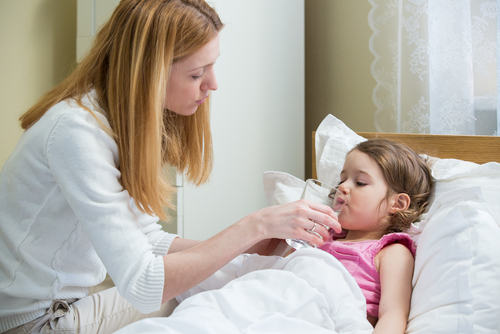Do probiotics really help kids with gastroenteritis?
M3 Global Newsdesk Dec 29, 2018
A 5-day course of Lactobacillus rhamnosus GG—sold over the counter as Culturelle—did not improve outcomes in preschool children with acute gastroenteritis, according to results of a study recently published in the New England Journal of Medicine.

In the United States, acute gastroenteritis is usually not lethal. Nevertheless, it accounts for roughly 1.7 million visits to emergency rooms and over 70,000 hospitalizations annually. Worldwide, it is the second leading cause of death in children less than 5 years old.
Some researchers have suggested that probiotics may improve outcomes in children with acute gastroenteritis, for which there are currently no treatment options outside of symptom control, and prevention of dehydration and secondary infections. Despite the fact that definitive research is scarce, all indications are that the use of probiotics has increased in the United States.
"Probiotics have become an increasingly popular way to treat children experiencing acute gastroenteritis," said lead author David Schnadower, MD, MPH, who conducted the research as a Washington University professor of paediatrics and a physician at St. Louis Children's Hospital, both in St. Louis, MO.
"Some smaller studies have indicated that probiotics may help, however, such studies had a number of limitations. We sought to provide independent and conclusive evidence for or against probiotic use in infants and toddlers with acute gastroenteritis."
For the prospective, randomized, double-blind Pediatric Emergency Care Applied Research Network (PECARN) study, Dr. Schnadower and colleagues included 971 children aged 3 months to 4 years (median age: 1.4 years; 52.9% male) with acute gastroenteritis who presented to 1 of 10 pediatric emergency departments throughout the United States.
Subjects were randomized to 5 days of treatment with L. rhamnosus GG (1x1010 colony-forming units BID; n=483), a commonly recommended and used probiotic, or placebo (n=488). Of these subjects, 943 (97.1%) completed the study.
Caregivers of these pediatric subjects were required to record their child’s symptoms in a daily diary. Researchers conducted daily follow-up surveys for 5 days, and then again at 14 days and 1 month after enrollment. The primary outcome of the study was moderate-to-severe gastroenteritis, defined as an episode with a modified Vesikari score of 9 or greater (range: 0-20).
- In 11.8% of subjects treated with L. rhamnosus GG, researchers found a modified Vesikari scale score of ≥ 9 compared with 12.6% of subjects treated with placebo (RR: 0.96; 95% CI: 0.68-1.35; P=0.83).
- No significant between-group differences were seen in duration of diarrhoea (median: 49.7 vs 50.9 hours, respectively; P=0.26), duration of vomiting (median: 0 hours in both groups; P=0.17), absence from day-care (median: 2 days in both groups; P=0.67), or rate of household transmission (10.6% vs 14.1%; P=0.16).
“We tested many different scenarios—infants compared with toddlers, whether the patient had taken antibiotics, whether the gastroenteritis was caused by virus or bacteria, and how long the diarrhoea had been going on before the treatment was given. We also had the probiotic independently tested for purity and strength. Every time, we reached the same conclusion. [L. rhamnosus GG] LGG did not help," said Dr. Schnadower, who is now senior academic director, Division of Emergency Medicine, Cincinnati Children’s Hospital Medical Center, Cincinnati, OH.
In the same issue of NEJM, researchers, including Dr. Schnadower, published results of a similar study performed in Canada. They examined the efficacy of a different probiotic, Lacidofil, which is comprised of L. rhamnosus R0011 and Lactobacillus helveticus R0052 at a dose of 4.0×109 colony-forming units, in children with gastroenteritis. Their results echoed those of the US study.
"Because of the popularity of probiotics, it was important to make sure their use is worth the cost. In this instance, probiotics added no measurable benefit, and, therefore, they are not worth the added cost," Dr. Schnadower concluded.
The US study was funded by the Eunice Kennedy Shriver National Institute of Child Health and Human Development, the Emergency Medical Services for Children Program of the Maternal and Child Health Bureau, Health Resources and Services Administration, the Washington University Biobank Core, supported by the National Institute of Diabetes and Digestive and Kidney Diseases of the National Institutes of Health; and iHealth, which provided L. rhamnosus GG and placebo capsules in kind.
The Canadian study was supported by the Canadian Institutes of Health Research, an Alberta Children’s Hospital Foundation Professorship in Child Health and Wellness , the Alberta Children’s Hospital Foundation to the Pediatric Emergency Medicine Research Associates Program, Calgary Laboratory Services (in kind), Provincial Laboratory for Public Health–Alberta Public Laboratories, Luminex, and Copan Italia.
This story is contributed by Liz Meszaros and is a part of our Global Content Initiative, where we feature selected stories from our Global network which we believe would be most useful and informative to our doctor members.
-
Exclusive Write-ups & Webinars by KOLs
-
Daily Quiz by specialty
-
Paid Market Research Surveys
-
Case discussions, News & Journals' summaries